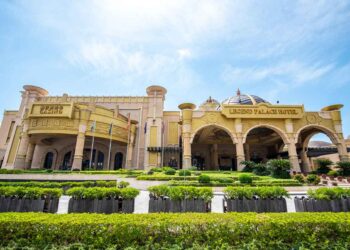The glittering prospects of casinos in Japan have lured yet another deep-pocketed American, Chicago real estate magnate Neil Bluhm, who says he’s keen to partner up on a US$4 billion-$5 billion resort in Osaka.
Mr Bluhm, who owns casinos in the Chicago area and in the US states of Pennsylvania and New York through a company called Rush Gaming, says he likes the pro-gaming stance of Osaka’s government and the fact that Japan’s second city is “shovel ready” for casino development, while Tokyo, though larger, is more consumed with preparations for the 2020 Summer Olympics and less committed.
He told Reuters he’s already in talks with Osaka-based companies, touching on an edge the 76-year-old, whose net worth is estimated by Forbes at US$2.6 billion, believes he has over his larger industry rivals. “In reality, they are going to want to totally run the project. They are probably not used to having partnership relationships like we are,” he said.
He also shrugs off their bigger bank accounts. “Sometimes people like to throw big numbers around in order to get picked. … We have been more for Osaka in the $4-$5 billion range,” he said.
Fifty-six percent of Osaka residents polled in April said they favor the city of 2.8 million having a resort-scale casino, and local authorities already have designated a 170-acre plot of reclaimed land, known as Yumeshima, as the preferred site.
Osaka’s Gov. Ichiro Matsui told Reuters last month that developers should commit to around $5 billion and bear some of the costs for improving infrastructure and the site’s transport links. On the plus side, Kansai Keizai Doyukai, a leading local business lobby, reckons land costs in Osaka will be only one-tenth of those in Tokyo and says the city can offer a development area three times bigger than that occupied by Singapore’s two megaresorts, Marina Bay Sands and Resorts World Sentosa.
“Osaka city is flexible,” said Masayuki Inoue, who heads economic strategy for the city. “We’re ready to discuss anything.”
Most analysts believe a government-backed bill legalizing casinos will be passed in the national parliament, the Diet, this year, paving the way for a licensing and regulatory regime to be crafted and approved in 2015, with the first resorts opening in time for the Olympics. Consensus is that two resorts will be authorized on a Singapore scale, one each for Tokyo and Osaka, with two or three smaller resorts granted to outlying areas to boost local tourism.
An A-list of global operators—Las Vegas Sands, MGM Resorts International, Wynn Resorts, Melco Crown Entertainment, Genting and SJM Holdings among them—are primping for a shot at a market some analysts believe could quickly emerge as the second- or third-largest in the world. As many as 12 casinos could be up and running over the next decade, according to analysis by CLSA Asia-Pacific Markets, ultimately generating combined gaming revenues in the neighborhood of US$40 billion.
Tokyo, the country’s commercial and tourism hub with its affluent population of 13 million, naturally is seen as the big prize, and Sands and MGM have said they’re prepared to spend as much as $10 billion to open there.
Not everyone shares the optimism, however. Morgan Stanley recently issued a report downsizing the revenue potential by some $20 billion and suggesting that any resort costing more than $5 billion will struggle to generate a return of more than 10%. The report questions the impact of the country’s high construction and labor costs and says the potential of the domestic gambling market could be smaller than anticipated. It also questions Japan’s appeal as an international gambling destination, particularly for high rollers from China and the Chinese junkets who recruit and bankroll them, neither of whom is likely to find a tightly regulated Singapore-style market all that appealing compared with Macau.
Privately, observers also are concerned about the Tokyo government’s muted response to date. Gov. Yoichi Masuzoe, a former health minister, has yet to say whether he will seek a casino license for the capital.
“We’re not like Osaka and Yokohama. We haven’t stepped on the accelerator and said let’s go,” a spokesman for his office told Reuters.
Securing enough land could also prove a challenge. A waterfront area called Odaiba in Tokyo Bay has been touted as a preferred location for a resort-scale casino. Reuters estimates that around 14 hectares (34.6 acres) are available in Odaiba for sale by the city. These are located behind the headquarters of TV broadcaster Fuji Media Holdings. Doubling it would require re-zoning parks and buying land currently owned by a real estate developer and Toyota Motor Corp. The city’s waterfront development division sparked concern among some casino watchers last month when it said it would auction a 2.7-hectare plot in Odaiba for a 10-year lease, effectively taking the land out of the gaming equation.

































